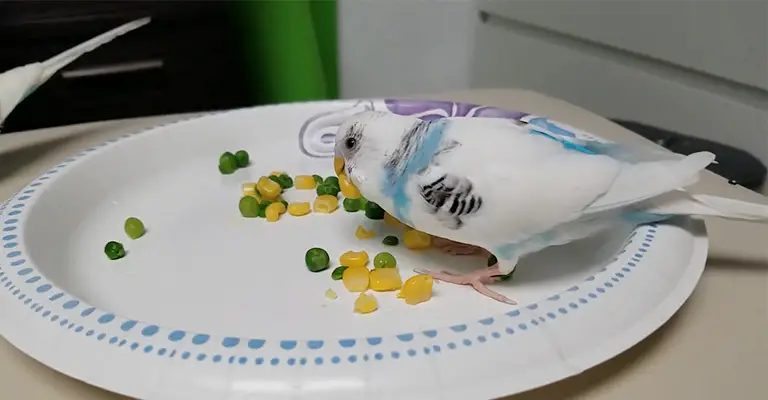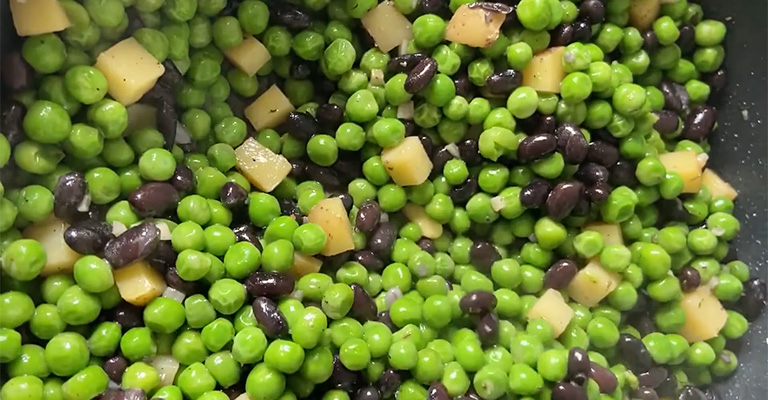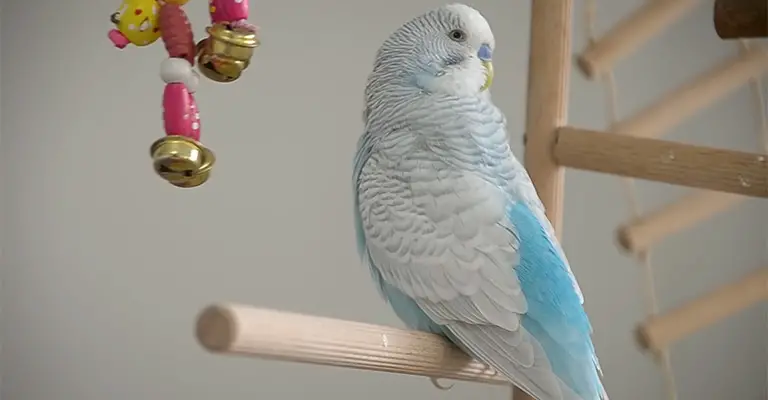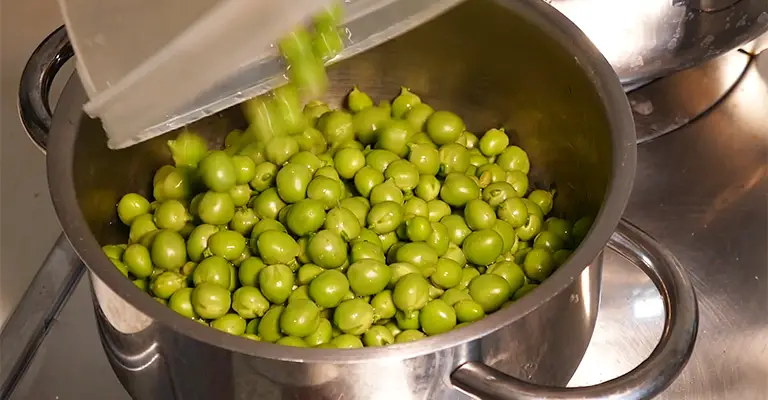The dietary preferences of our avian companions often lead to questions about their suitability for certain foods.
Among these queries, the inquiry “Can budgies eat peas?” stands as a testament to our commitment to providing the best care for these vibrant birds.
Budgerigars, affectionately known as budgies, have a diverse diet that mimics their natural foraging behaviours.
In the pursuit of a balanced and enriching diet, understanding the compatibility of peas with their nutritional needs becomes essential.
This exploration delves into the fascinating world of budgie nutrition, shedding light on the potential benefits and considerations surrounding the inclusion of peas in their culinary repertoire.

Can Budgies Eat Peas?
Yes, budgies can eat peas and enjoy their fantastic benefits. Peas are nutritious and delicious vegetables that can provide your budgie with many health and wellness advantages.
Here are some of them, along with some explanations of each point:
Peas Are Rich In Protein
Protein is an essential nutrient that helps your budgie build and repair their muscles, feathers, skin, and organs.
Peas are one of the best plant sources of protein, as they contain about 5 grams of protein per 100 grams. Protein also helps your budgie feel full and satisfied and prevents overeating or obesity.
Peas Are High In Fibre
Fibre is a type of carbohydrate that helps your budgie digest their food and regulate their bowel movements. Peas are high in fibre, as they contain about 5 grams of fibre per 100 grams.
Fibre also helps your budgie prevent constipation, diarrhoea, or impaction. Fibre also helps your budgie lower their cholesterol and blood sugar levels and reduce the risk of heart disease or diabetes.
Peas Are Low In Fat And Calories
Fat and calories are important for your budgie’s energy and health, but too much of them can cause weight gain or health problems.
Peas are low in fat and calories, as they contain only 0.4 grams of fat and 81 calories per 100 grams. Peas are also low in saturated fat and cholesterol, which can harm your budgie’s heart or liver.
Peas Are Loaded With Vitamins

Vitamins are organic compounds that help your budgie perform various functions and processes in their body. Peas are loaded with vitamins, especially vitamin A, vitamin C, vitamin K, and vitamin B complex.
Vitamin A helps your budgie maintain their vision, skin, and immune system. Vitamin C helps your budgie fight infections, heal wounds, and prevent scurvy. Vitamin K helps your budgie clot their blood and prevent bleeding.
Peas Are Packed With Minerals
Minerals are inorganic elements that help your budgie balance their fluids and electrolytes and strengthen their bones and teeth. Peas are packed with minerals, especially iron, calcium, magnesium, phosphorus, potassium, zinc, and manganese.
Iron helps your budgie transport oxygen in their blood and prevent anaemia. Calcium helps your budgie form and maintain their bones and teeth. Magnesium helps your budgie relax their muscles and nerves.
Peas Are Good For The Skin And Feathers
The skin and feathers are the largest organs of your budgie, and they need proper care and nutrition to stay healthy and beautiful.
Peas are good for the skin and feathers, as they contain antioxidants, phytochemicals, and omega-3 fatty acids. Antioxidants help your budgie protect its skin and feathers from free radical damage and ageing.
Phytochemicals help your budgie fight inflammation and infection in their skin and feathers. Omega-3 fatty acids help your budgie moisturize and nourish their skin and feathers.
Peas Are Beneficial For The Brain And Mood
The brain is the most complex organ of your budgie, and it needs proper care and nutrition to function well and stay happy. Peas are beneficial for the brain and mood as they contain folate, choline, and tryptophan.
Folate helps your budgie produce neurotransmitters such as serotonin, dopamine, and norepinephrine, which regulate their mood and emotions.
Peas Are Fun To Eat And Play With
Budgies are playful and curious birds that need physical and mental stimulation to keep them happy and active. Peas are fun to eat and play with, as they have a crunchy texture, a sweet flavor, and a bright color.
Budgies can enjoy peeling, popping, or tossing the peas around or sharing them with their mates or owners.
Peas can also help your budgie exercise their beak, tongue, and jaw muscles and improve their coordination and dexterity.
Peas Are Easy To Prepare And Store
Budgies need fresh and clean food every day, preferably in a bottle or a bowl that is not contaminated by food or droppings. Peas are easy to prepare and store, as they do not require much cooking or processing.
You can simply wash and rinse the peas and offer them whole or chopped to your budgie.
What Are The Things To Watch Out For When Feeding Budgies Peas?

Peas are generally safe and healthy for budgies, but there are some things to watch out for when feeding them peas.
Here are some of them:
Allergies
Some budgies may be allergic to peas or other legumes and may experience symptoms such as itching, swelling, or breathing difficulties after eating them.
If you notice any signs of an allergic reaction in your budgie, you should stop feeding them peas and consult your veterinarian immediately.
Pesticides
Peas may contain pesticides or other chemicals that can harm your budgie’s health. Pesticides can cause problems such as nausea, vomiting, diarrhoea, or neurological damage in your budgie.
You should always wash and rinse the peas thoroughly before feeding them to your budgie, or choose organic or homegrown peas if possible.
Mold
Peas may develop mould or fungus if they are stored improperly or for too long. Mould can cause infections or poisoning in your budgie and may affect their digestion, immunity, or liver.
You should always check the peas for any signs of mould or spoilage before feeding them to your budgie, and discard any that look or smell bad.
Choking
Peas may pose a choking hazard for your budgie if they are too large or hard for them to swallow. Choking can cause suffocation or injury in your budgie and may require emergency intervention.
You should always chop the peas into small pieces or mash them before feeding them to your budgie and monitor them while they eat.
Overfeeding
Peas are nutritious and delicious, but too much of them can cause problems for your budgie. ‘
Overfeeding can cause obesity, diabetes, or kidney stones in your budgie and may affect their appetite or digestion.
You should feed your budgie peas in moderation and balance them with other foods such as pellets, fruits, and vegetables.
Gas
Peas are high in fibre and starch, which can cause gas or bloating in your budgie. Gas can cause discomfort or pain in your budgie and may affect their mood or behaviour.
You should feed your budgie peas sparingly and avoid feeding them other gas-producing foods such as beans, cabbage, or broccoli.
Calcium Oxalate
Peas contain calcium oxalate, which is a compound that can bind with calcium and prevent its absorption in your budgie’s body. Calcium is important for your budgie’s bones, teeth, muscles, and nerves.
Calcium oxalate can cause calcium deficiency or hypocalcemia in your budgie, which can lead to weakness, seizures, or paralysis.
Phytic Acid
Peas contain phytic acid, which is a compound that can bind with minerals such as iron, zinc, or magnesium and prevent their absorption in your budgie’s body. Minerals are important for your budgie’s blood, bones, teeth, and functions.
Phytic acid can cause mineral deficiency or anaemia in your budgie, which can lead to fatigue, pale skin, or poor growth.
Lectins
Peas contain lectins, which are proteins that can interfere with the digestion or absorption of nutrients in your budgie’s body.
Lectins can cause problems such as inflammation, irritation, or damage in your budgie’s gut and may affect their immunity or metabolism.
You should feed your budgie-cooked peas only, as cooking can reduce the amount or activity of lectins in the peas.
How To Feed Peas To Budgies?

There are many ways to feed peas to budgies, depending on their preferences and needs.
Here are some of them:
Whole Peas
You can feed your budgie whole peas, either fresh or frozen. You can simply wash and rinse the peas and offer them to your budgie in a bowl or a foraging toy.
Whole peas are fun and crunchy for your budgie, and they can exercise their beak and jaw muscles by peeling or popping them.
Chopped Peas
You can feed your budgie chopped peas, either fresh or frozen. You can wash and rinse the peas and chop them into small pieces using a knife or a food processor. You can then offer them to your budgie in a bowl or a foraging toy.
Chopped peas are easier and safer for your budgie to swallow, and they can prevent choking or impaction.
Mashed Peas
You can feed your budgie mashed peas, either fresh or frozen. You can wash and rinse the peas and mash them using a fork or a blender.
You can then offer them to your budgie in a bowl or a spoon. Mashed peas are soft and smooth for your budgie, and they can help them digest their food better.
Cooked Peas
You can feed your budgie cooked peas, either fresh or frozen. You can wash and rinse the peas and cook them in boiling water for a few minutes until they are tender.
You can then drain and cool the peas and offer them to your budgie in a bowl or a foraging toy.
Mixed Peas
You can feed your budgie mixed peas, either fresh or frozen. You can wash and rinse the peas and mix them with other foods that your budgie likes, such as pellets, fruits, vegetables, or millet sprays.
You can then offer them to your budgie in a bowl or a foraging toy. Mixed peas are more varied and balanced for your budgie, and they can provide them with different nutrients and flavours.
Sprouted Peas
You can feed your budgie-sprouted peas, either fresh or dried. You can soak the peas in water for 12 hours and then drain and rinse them.
You can then place them in a jar or a tray with a damp paper towel and keep them in a warm and dark place for 2 to 3 days until they sprout.
You can then wash and rinse the sprouted peas and offer them to your budgie in a bowl or a foraging toy.
Pea Shoots
You can feed your budgie pea shoots, either fresh or dried. Pea shoots are the young leaves of the pea plant that grow after the sprouting stage.
You can buy them from a grocery store or a farmer’s market or grow them yourself from pea seeds.
Pea Pods
You can feed your budgie pea pods, either fresh or frozen. Pea pods are the green or yellow shells that enclose the pea seeds.
You can buy them from a grocery store or a farmer’s market or pick them yourself from a pea plant.
Pea Soup
You can feed your budgie pea soup, either homemade or store-bought. Pea soup is a liquid dish that is made from pureed or blended peas, water, and other ingredients such as onion, garlic, carrot, or mint.
You can make it yourself by following a simple recipe or buying it from a grocery store or a restaurant.
FAQ
Yes, budgies can eat peas, but they should be given in moderation. Peas can provide nutrients like fibre, vitamins, and minerals that contribute to a varied diet for your budgie.
Fresh or frozen plain peas are safe for budgies. Avoid canned peas that might contain added salt or seasonings.
Offer fresh or frozen peas that have been thawed. You can lightly cook or blanch them to make them softer, which can be easier for budgies to eat.
Peas can be included as a part of a varied diet that includes other vegetables, fruits, and high-quality budgie pellets. Diversity is key to meeting their nutritional needs.
While peas are generally safe, they are starchy. Overfeeding starchy foods can lead to weight gain. Always introduce new foods gradually to monitor your budgie’s response and ensure a balanced diet.
Conclusion
In the tapestry of budgie cuisine, the query of whether these birds can consume peas finds its answer in both their natural inclinations and nutritional requirements.
While peas can be a valuable addition, they should be introduced with caution and in moderation, owing to their high starch content.
By integrating a variety of fresh vegetables and balanced nutrient sources into their diet, caregivers can ensure the well-being and vitality of their budgies.
As we navigate the intricacies of avian nutrition, we embark on a journey that honours the symbiotic relationship between these delightful companions and the nourishing choices we make on their behalf.